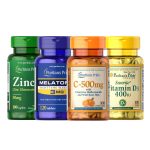Achieving Hormonal Balance: The Best Vitamins for Women

Hormonal balance is crucial for the overall health and well-being of women. Hormones play a pivotal role in various physiological processes, influencing mood, energy levels, metabolism, and reproductive health. Maintaining hormonal equilibrium is essential for optimal functioning of the female body.
While lifestyle factors such as diet, exercise, and stress management contribute significantly to hormonal balance, certain vitamins play a key role in supporting these efforts. In this article, we will explore the best vitamins for females to promote hormonal balance.
Understanding Hormonal Imbalance
Before delving into the vitamins that aid hormonal balance, it’s essential to comprehend what hormonal imbalance entails. Hormones act as messengers in the body, regulating processes such as menstrual cycles, metabolism, and stress response. When there’s an imbalance, it can lead to various health issues, including irregular periods, mood swings, weight gain, and fertility problems.
The Role of Vitamins in Hormonal Balance
Vitamins are micronutrients that play a crucial role in numerous bodily functions, including hormone production and regulation. Incorporating a balanced and nutrient-rich diet is fundamental for ensuring the body receives the vitamins it needs to support hormonal balance. Here are some of the best vitamins for females in this regard:
1. Vitamin D
Role in Hormonal Balance: Vitamin D is vital for the production of hormones, particularly in women. It influences the synthesis of estrogen and progesterone, the two key female sex hormones. Adequate vitamin D levels are associated with improved fertility, menstrual regularity, and overall reproductive health.
Sources:
• Sunlight exposure
• Fatty fish (salmon, mackerel)
• Fortified dairy products
• Egg yolks
2. Vitamin B Complex
Role in Hormonal Balance: The B-vitamin complex, including B6, B9 (folate), and B12, plays a crucial role in hormonal balance. Vitamin B6, for instance, is involved in estrogen metabolism, while folate supports overall reproductive health and fetal development during pregnancy.
Sources:
• Whole grains
• Leafy greens
• Meat (chicken, turkey)
• Legumes (beans, lentils)
• Fortified cereals
3. Vitamin E
Role in Hormonal Balance: Vitamin E is an antioxidant that helps regulate hormonal balance by influencing the synthesis of sex hormones. It may also alleviate symptoms of premenstrual syndrome (PMS) in women.
Sources:
• Nuts and seeds (almonds, sunflower seeds)
• Spinach
• Avocado
• Vegetable oils (sunflower, safflower)
4. Vitamin A
Role in Hormonal Balance: Vitamin A is essential for the production of sex hormones and plays a crucial role in reproductive health. It supports the health of the ovaries and ensures proper development of follicles.
Sources:
• Sweet potatoes
• Carrots
• Leafy greens
• Liver
• Eggs
5. Vitamin C
Role in Hormonal Balance: Vitamin C is known for its antioxidant properties and aids in the synthesis of hormones, including those produced by the adrenal glands. It helps combat stress and supports the overall function of the endocrine system.
Sources:
• Citrus fruits (oranges, lemons)
• Berries (strawberries, blueberries)
• Bell peppers
• Broccoli
6. Vitamin K2
Role in Hormonal Balance: Vitamin K2 is crucial for bone health and aids in the regulation of sex hormones. It ensures proper calcium metabolism, which is essential for hormonal balance, especially during menopause.
Sources:
• Fermented foods (natto, sauerkraut)
• Cheese
• Meat
• Leafy greens
7. Omega-3 Fatty Acids
Role in Hormonal Balance: While not a vitamin, omega-3 fatty acids are essential for hormonal health. They support the production of hormones, including prostaglandins, which play a role in menstrual regulation.
Sources:
• Fatty fish (salmon, sardines)
• Flaxseeds
• Chia seeds
• Walnuts
Dietary Tips for Hormonal Balance
In addition to incorporating the right vitamins, adopting a balanced and nutritious diet is crucial for hormonal health. Here are some dietary tips to promote hormonal balance:
1. Consume Whole Foods: Choose whole, unprocessed foods to ensure you get a broad spectrum of nutrients. Fresh fruits, vegetables, whole grains, and lean proteins contribute to overall health and hormonal balance.
2. Include Fiber-Rich Foods: Fiber aids in the elimination of excess hormones from the body. Whole grains, fruits, and vegetables are excellent sources of dietary fiber.
3. Maintain Healthy Fats: Incorporate healthy fats into your diet, such as those found in avocados, olive oil, and fatty fish. These fats support hormone production and overall health.
4. Stay Hydrated: Adequate hydration is essential for hormone regulation and overall bodily functions. Opt for water and herbal teas throughout the day.
5. Limit Processed Foods and Sugar: Processed foods and excessive sugar intake can contribute to hormonal imbalances. Limiting these items can positively impact overall health.
Consultation with Healthcare Professionals
While vitamins play a crucial role in hormonal balance, it’s important to note that individual needs may vary. Consulting with healthcare professionals, such as nutritionists or endocrinologists, can provide personalized guidance based on specific health conditions, age, and lifestyle factors.
How to Find Quality Vitamins
Finding good brands of vitamins for hormonal balance in women requires careful consideration and research. Here are some popular options and places where you can purchase high-quality vitamins:
1. Thorne Research: Thorne Research is known for its high-quality, science-based supplements. They offer a range of vitamins and minerals designed to support hormonal balance in women.
2. Life Extension: Life Extension is a reputable brand that provides a variety of supplements, including those focused on women’s health. They emphasize scientific research in formulating their products.
3. New Chapter: New Chapter is committed to using organic and non-GMO ingredients. They offer a variety of whole-food-based supplements, including those tailored to women’s hormonal health.
4. Garden of Life: Garden of Life is known for its organic and plant-based supplements. They have a specific line of products designed to support women’s health, including hormonal balance.
5. MegaFood: MegaFood specializes in creating vitamins and supplements from real food sources. They have products formulated to support women’s health, including those addressing hormonal imbalances.
6. Nordic Naturals: While renowned for their high-quality fish oil supplements, Nordic Naturals also offers a range of women’s health supplements, including those supporting hormonal balance.
7. Vitanica: Vitanica is a brand dedicated to women’s health. They provide a variety of supplements formulated to address hormonal issues, including menstrual and menopausal support.
8. Pure Encapsulations: Pure Encapsulations is known for its hypoallergenic supplements. They offer a women’s health line that includes vitamins and minerals for hormonal balance.
Where to Purchase
1. Online Retailers: Websites like Amazon, iHerb, and Vitacost offer a wide selection of vitamins and supplements. Ensure that you buy from reputable sellers and check customer reviews.
2. Health Food Stores: Local health food stores or specialty stores often carry a range of high-quality vitamin brands. The staff may also provide guidance on products suitable for hormonal balance.
3. Pharmacies: Some pharmacies carry a selection of reputable supplement brands. Check with your local pharmacy or ask your healthcare provider for recommendations.
4. Healthcare Practitioner’s Office: Many healthcare practitioners offer supplements directly from their offices. They can provide personalized recommendations based on your health needs.
5. Brand Websites: Consider purchasing directly from the official websites of the vitamin brands especially cheaper brands like Puritan Pride Vitamins. This ensures product authenticity and often provides additional information on product formulations.
Before adding any new supplement to your routine, it’s advisable to consult with a healthcare professional, especially if you have specific health concerns or are taking other medications. They can provide personalized advice based on your individual health profile.
Conclusion
Achieving and maintaining hormonal balance is a multifaceted endeavor that involves various lifestyle factors, with nutrition being a cornerstone. The vitamins mentioned – D, B complex, E, A, C, K2, and omega-3 fatty acids – contribute significantly to hormonal health. However, it’s crucial to approach dietary changes with a holistic mindset, considering overall nutrition and lifestyle choices.
By embracing a balanced diet rich in these vitamins and adopting healthy lifestyle practices, women can support their hormonal health and enhance overall well-being. As always, individual needs vary, and seeking guidance from healthcare professionals ensures a tailored approach to achieving and maintaining hormonal balance throughout different life stages.






One Comment